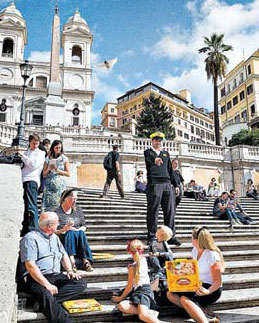Buon appetito doesn't apply at landmarks
Updated: 2012-11-04 10:58
By Elisabetta Povoledo (The New York Times)
|
|||||||||||
 |
|
Roman authorities are cracking down on people eating or drinking at sites like the Spanish Steps. Paolo Marchetti for The International herald tribune |
ROME - Members of Rome's municipal police force were on the Spanish Steps one warm autumn day, looking for offenders. "Stefano, look! There's another eater," one officer said to another before sauntering over to a baffled couple who had begun munching on a meal while sitting on the steps. The culprits, a couple of foreign tourists, had settled down on the famous landmark. In their hands were the offending items: sandwiches.
They were in violation of a municipal ordinance that went into force in October. The measure outlaws eating and drinking in areas of "particular historic, artistic, architectonic and cultural value" in Rome's center, to better protect landmarks like the Colosseum, the Pantheon and the Spanish Steps. Fines range to $650 for culinary recidivists.
Italian cities, Rome included, have long enacted ordinances to protect monuments from ill-mannered tourists and residents. But after a recent stroll through the city center, where he saw several people making themselves at home, literally, Rome's mayor, Gianni Alemanno, decided the rules needed toughening. The new ordinance, which also outlaws "setting up makeshift beds," will "give monuments back their proper decorum," said Antonio Gazzellone, the municipal council member responsible for tourism. "Rome needs to be protected, its beauty respected."
Some fretted that the ordinance is too broad. "From now on, a tourist walking around the Colosseum with an ice cream cone will be fined," said Angelo Bonelli, a member of Italy's Green Party, who challenged the ban by eating a sandwich in front of a police officer at the Pantheon.
Rome has passed bans during the past five years against prostitutes, homeless people and men taking their shirts off in parks to sunbathe, Mr. Bonelli noted, often to little effect. "You can't govern with bans," he said.
Many Romans agree. On a recent Saturday, a few hundred protesters gathered on the steps leading to City Hall, eating pizza and panini as police officers registered the offenders.
Other Italian cities have also taken measures to promote civility and good manners. For years it has been illegal in Venice to eat bag lunches while sitting on the steps around St. Mark's Square, where 25 million tourists converge each year, said Marco Agostini, the city's director general.
"It's the one place in Venice that all visitors want to see," he said, "and we can't have a situation where you have to climb over people eating salami sandwiches."
In Florence, rope cordons went up this summer around the steps of the city's cathedral, where visitors were asked not to sit.
"We'll see what the results are," Mr. Gazzellone said of Rome's new law. "Personally, I hope it is never applied - because it means that citizens and guests to Rome have understood how to behave. I hope we don't make a penny - because it means the city is being respected in its beauty."
The New York Times
Related Stories
CCTV eyes global opportunities 2012-09-18 14:21
Spanish Princess's birthday photos 2012-09-17 10:07
Singing in chorus 2012-07-30 14:47
Singing magnet 2012-06-11 09:34
Pop queen set to wow 2012-05-04 10:45
Today's Top News
Rescuers race against time for quake victims
Telecom workers restore links
Coal mine blast kills 18 in Jilin
Intl scholarship puts China on the map
More bird flu patients discharged
Gold loses sheen, but still a safe bet
US 'turns blind eye to human rights'
Telecom workers restore links
Hot Topics
Lunar probe , China growth forecasts, Emission rules get tougher, China seen through 'colored lens', International board,
Editor's Picks

|

|

|

|

|

|





